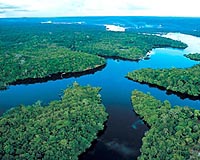| . |  |
. |
Cambridge, UK (SPX) Jun 16, 2009 Clearing the Amazon rainforest increases Brazilian communities' wealth and quality of life, but these improvements are short-lived, according to new research published in Science. The study, by an international team including researchers at the University of Cambridge and Imperial College London, shows that levels of development revert back to well below national average levels when the loggers and land clearers move on. Since 2000, 155 thousand square kilometres of rainforest in the Brazilian Amazon have been cut down for timber, burnt, or cleared for agricultural use. Forest clearance rates have averaged more than 1.8 million hectares per year (roughly the area of Kuwait), and the deforestation frontier is advancing into the forest at a rate of more than four football fields every minute. The team behind the study analysed changes in the average life expectancy, literacy and per capita income of people living in 286 Brazilian Amazon municipalities with varying levels of deforestation. The Amazon is one of the least developed regions in Brazil, but is also one of the most important places on the planet for biodiversity, climate and geochemical cycles. The researchers' analysis revealed that the quality of local people's lives -measured through levels of income, literacy and longevity, as mentioned above - increases quickly during the early stages of deforestation. This is probably because people capitalise on newly available natural resources, including timber, minerals and land for pasture, and higher incomes and new roads lead to improved access to education and medical care, and all round better living conditions. However, the new results suggest that these improvements are transitory, and the level of development returns to below the national average once the area's natural resources have been exploited and the deforestation frontier expands to virgin land. Quality of life pre- and post-deforestation was both substantially lower than the Brazilian national average, and was indistinguishable from one another. Ana Rodrigues, lead author of the study, previously at the University of Cambridge and currently at the Centre of Functional and Evolutionary Ecology, France, said: "The Amazon is globally recognised for its unparalleled natural value, but it is also a very poor region. It is generally assumed that replacing the forest with crops and pastureland is the best approach for fulfilling the region's legitimate aspirations to development. This study tested that assumption. We found although the deforestation frontier does bring initial improvements in income, life expectancy, and literacy, such gains are not sustained." Fellow author Dr Rob Ewers from Imperial College London's Department of Life Sciences adds: "The 'boom' in development that deforestation brings to these areas is clear, but our data show that in the long run these benefits are not sustained. Along with environmental concerns, this is another good reason to restrict further deforestation in the Amazon," he says. "However, in areas that are currently being deforested, the process needs to be better managed to ensure that for local people boom isn't necessarily followed by 'bust'." The decline in development which occurs once an area has been deforested is likely due to the depletion of the natural resources that supported the initial boom. Timber is exhausted and land used for cattle ranching and farming is often rapidly degraded, leading to large scale abandonment - for example, by the early 1990s, one third of the area used for pastures had already been abandoned. This is compounded by an increasing human population as migrants including ranchers, farmers, colonists, landless peasants, gold miners, loggers, and land grabbers arrive, lured to the area by the prospect of rapid financial gain. Andrew Balmford, co-author of the study and University of Cambridge Professor of Conservation Science, concluded: "The current boom-and-bust trajectory of Amazonian development is therefore undesirable in human terms as well as potentially disastrous for other species, and for the world's climate. Reversing this pattern will hinge on capturing the values of intact forests to people outside the Amazon so that local people's livelihoods are better when the forest is left standing than when it is cleared. "This will be extremely difficult, both financially and practically. But discussions being held in the run-up to this December's crucial climate change meeting in Copenhagen about richer countries paying ones such as Brazil to retain the carbon stored in their forests offer some promise that this lose-lose-lose situation could be tackled, to the benefit of everyone - local Brazilians included." Share This Article With Planet Earth
Related Links University of Cambridge Forestry News - Global and Local News, Science and Application
 Peru suspends plans to exploit Amazon
Peru suspends plans to exploit AmazonLima (UPI) Jun 15, 2009 Facing crisis after dozens of people were killed in clashes, Peru's Congress has suspended for three months plans to open large swathes of the Peruvian Amazon to foreign investment. The move was made as public support for indigenous groups widens. Last Friday riot police broke up demonstrations in the capital Lima, and the government imposed a curfew on several towns in the Amazonian ... read more |
|
| The content herein, unless otherwise known to be public domain, are Copyright 1995-2009 - SpaceDaily. AFP and UPI Wire Stories are copyright Agence France-Presse and United Press International. ESA Portal Reports are copyright European Space Agency. All NASA sourced material is public domain. Additional copyrights may apply in whole or part to other bona fide parties. Advertising does not imply endorsement,agreement or approval of any opinions, statements or information provided by SpaceDaily on any Web page published or hosted by SpaceDaily. Privacy Statement |